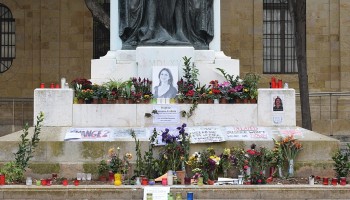Rebecca Vincent of Reporters Without Borders tweeted a video of a candlelight vigil in Malta’s capital, Valletta. ICIJ reported that more vigils were held in the United Kingdom, Germany and Belgium as well.
“The beautiful people of Malta gathered tonight in Valletta to remember #DaphneCaruanaGalizia, more determined than ever to achieve full justice. It was such an honour to be part of this very moving moment. We are with you.”
The crowd gathered to remember Caruana Galizia and bring attention to the fact that justice has still not been served two years after the country’s most well-known investigative reporter was assassinated near her home by a car bomb. Three men have been charged with the murder, but it is widely suspected that those who ordered the assassination are still at large.
Reporters Without Borders released a report detailing the events of the assassination, the failures of the subsequent investigation, international reaction, and finally the organization’s recommendations for achieving justice in Malta.
It notes that journalists who “pursue public interest investigative reporting in Malta remain at great risk, and citizen journalists and activists who remain vigilant in the campaign for justice are subjected to pressure and abuse.”
Meanwhile, the Council of Europe appointed last year senior Dutch politician Pieter Omtzigt to monitor the case. He criticized the police investigation and the entire attitude toward it in Malta.
“I am concerned that the authorities may have turned down evidence that could lead to whoever ordered the murder,” he said in an interview with The Guardian.
The EU rapporteur added that he is worried about the lack of physical protection for one of the imprisoned hitmen who has spoken to authorities about a middle-man in exchange for a reduced sentence. The man, allegedly, fears for his life and is reluctant to eat prison food.
The Guardian said that Omtizgt has reported to the Council of Europe about government corruption in Azerbaijan, mass surveillance by the US and other investigations but only in Malta has he needed police protection.
Malta’s prime minister, Joseph Muscat, has questioned Omtzigt’s credibility and accused him of telling “lies.”
But Omtzigt told The Guardian that it was the Maltese authorities that have been refusing to answer his questions and that they have been coming up with “all kinds of stories.”
“Even in Mongolia, people who were exposed in the Panama Papers had to resign,” Omtzigt said. “Everywhere people resigned. Except Malta. Malta is the only exception we can find.”






